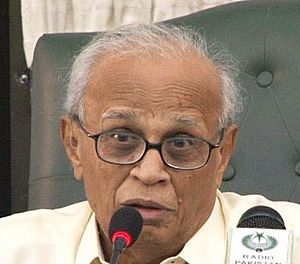Fakhruddin G. Ebrahim facts for kids
Quick facts for kids
Fakhruddin G. Ebrahim
|
|
|---|---|
 |
|
| Chief Election Commissioner | |
| In office 9 July 2012 – 31 July 2013 |
|
| 18th Governor of Sindh | |
| In office 19 April 1989 – 6 August 1990 |
|
| President | Ghulam Ishaq Khan |
| Prime Minister | Benazir Bhutto |
| Preceded by | Qadeeruddin Ahmed |
| Succeeded by | Mahmoud Haroon |
| 2nd Attorney General of Pakistan | |
| In office 20 December 1971 – 5 July 1977 |
|
| President | Zulfikar Ali Bhutto Fazal Ilahi Chaudhry |
| Prime Minister | Zulfikar Ali Bhutto |
| Deputy | Yahya Bakhtiar |
| Preceded by | Syed Sharifuddin Pirzada |
| Succeeded by | Syed Sharifuddin Pirzada |
| Personal details | |
| Born | 12 February 1928 Ahmedabad, Bombay Presidency, British India |
| Died | 7 January 2020 (aged 91) Karachi, Pakistan |
| Citizenship | Pakistani |
| Residence | Karachi |
| Alma mater | Gujarat Vidyapith Sindh Muslim Law College |
| Cabinet | Benazir Bhutto Government Zulfikar Ali Bhutto Government |
Fakhruddin G. Ebrahim (February 12, 1928 – January 7, 2020) was a very respected Pakistani judge and legal expert. He was known for his strong belief in justice and fairness. He served in many important roles, including the Chief Election Commissioner and a judge of the Supreme Court of Pakistan.
Contents
Early Life and Education
Fakhruddin G. Ebrahim was born in 1928 in Ahmedabad, which was then part of British India. He studied law and earned his degree in 1949. During his studies, he was inspired by the teachings of Mahatma Gandhi, especially about non-violence.
In 1950, he moved to Pakistan. He continued his legal studies at the Sindh Muslim Law College in Karachi. Later, he started his own law firm and also taught law.
Important Public Roles
Fakhruddin G. Ebrahim held several key positions in Pakistan's government and legal system.
Attorney General
In 1971, he was appointed as the Attorney General of Pakistan. This role meant he was the chief legal advisor to the government. He served in this position until 1977.
Governor of Sindh
From 1989 to 1990, he served as the Governor of Sindh. The Governor is the head of the province, representing the federal government.
Interim Minister
He also briefly served as the interim Law Minister and Justice Minister in the 1990s. These roles involved overseeing the country's legal system.
Chief Election Commissioner
One of his most important roles was serving as the Chief Election Commissioner of Pakistan. He was appointed in 2012 and oversaw the 2013 Pakistani general election. This election was very important for Pakistan's democracy.
Standing Up for Justice
Fakhruddin G. Ebrahim was known for his courage and commitment to justice. In 1981, when he was a judge in the Supreme Court, he refused to take a new oath. This oath was part of a special order that would have reduced the independence of judges. By refusing, he showed that he believed judges should be free to make decisions without pressure from the government.
Helping Citizens
In 1989, he started the Citizens-Police Liaison Committee (CPLC). This committee helps people in Karachi if they have trouble reporting crimes to the police. The CPLC works to make sure citizens can get their complaints officially recorded.
Involvement in Cricket
Fakhruddin G. Ebrahim also played a role in Pakistani cricket. In 1995, he led an investigation for the Pakistan Cricket Board (PCB). This inquiry looked into claims of unfair play during cricket matches. Later, in 2006, he chaired a committee that heard appeals in anti-doping cases for cricketers.
Fakhruddin G. Ebrahim passed away on January 7, 2020, in Karachi, Pakistan. He is remembered as a dedicated public servant who worked hard for justice and fairness in his country.
 | Audre Lorde |
 | John Berry Meachum |
 | Ferdinand Lee Barnett |

